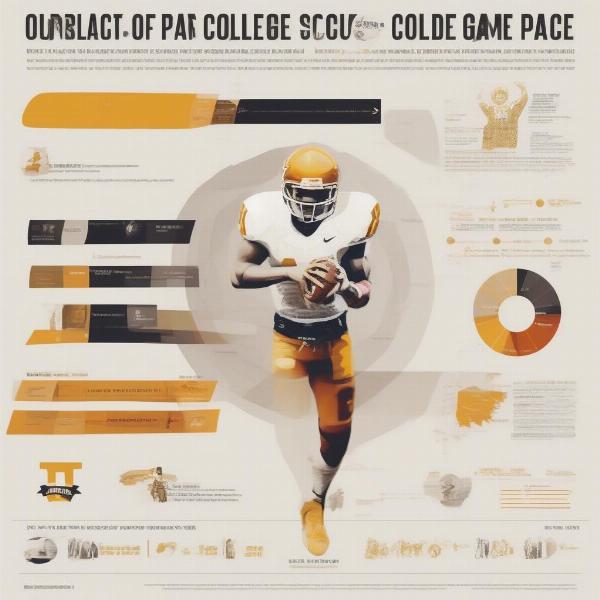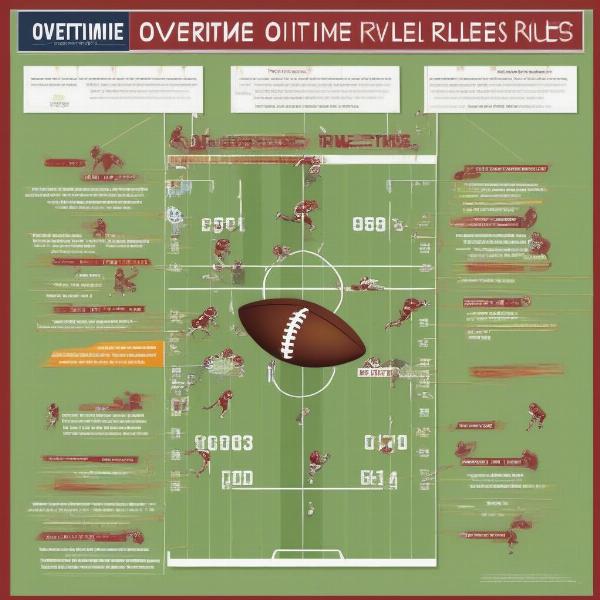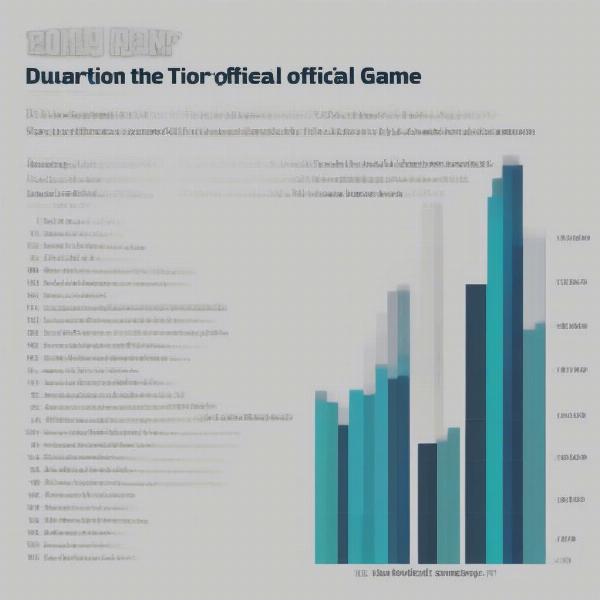How Long Do College Football Games Last? This is a question many fans, especially newcomers to the sport, frequently ask. The answer isn’t as straightforward as you might think, as several factors can influence the game’s duration. This comprehensive guide will delve into the intricacies of college football game lengths, providing you with a clear understanding of what to expect.
The standard answer, often cited, is three hours. However, this is merely an average, and the actual playtime can vary significantly. Let’s explore the reasons behind this variability.
Understanding the Clock: Game Time vs. Real Time
One crucial aspect to understand is the difference between game time and real time. Game time refers to the actual time the clock is running during gameplay. Real time, on the other hand, encompasses the entire duration of the event, including breaks, timeouts, and halftime. Real-time duration often exceeds game time considerably.
How Game Time Works
College football games are divided into four 15-minute quarters. However, the clock stops frequently for various reasons, including:
- Incomplete passes: When a pass is incomplete, the clock stops.
- Running out of bounds: When a player runs out of bounds, the clock stops.
- Penalties: Penalties incurred by either team halt the clock.
- Timeouts: Each team has three timeouts per half, which can be used strategically to stop the clock.
- Injuries: Medical timeouts are called when a player is injured, temporarily halting play.
These stoppages contribute significantly to the overall real-time duration of the game.
Factors Influencing Game Length
Several factors contribute to the variability of college football game length:
- The Pace of Play: Faster-paced games, characterized by quick snaps and fewer stoppages, generally end sooner. Conversely, games with many penalties, injuries, and timeouts tend to drag on.
- Number of Timeouts: Strategic timeout usage by coaches plays a crucial role. A team can use timeouts to regroup, strategize, or simply slow the opposing team’s momentum. This often leads to longer game times.
- Close Scores: Close games often result in longer playing times because teams tend to use more timeouts and the final moments of the game are often filled with suspense and deliberate plays. Think about it—a close game will have more timeouts used at the end.
- Overtime: If the game is tied at the end of regulation, overtime rules come into play, adding extra time to the already existing duration. How long does an average high school football game last is significantly shorter, but overtime rules have similar impacts. While similar, it’s different, illustrating the uniqueness of college-level play.
 College football game length factors influencing real-time duration
College football game length factors influencing real-time duration
How Long is a College Football Game in Real Time?
So, given all these variables, how long does a college football game actually take? A reasonable estimate for real-time duration is between 3 to 4 hours. However, games have been known to exceed this timeframe, especially when overtime is involved.
What About Overtime?
Overtime rules in college football can add significant time. They typically involve a series of possessions for each team, continuing until a winner is determined. This means that a game ending in overtime could stretch into 4 hours or even longer.
How Long Does the Halftime Show Take?
Typically, the halftime show lasts around 20 minutes. This is a relatively consistent duration across most games, providing a much-needed break for players and a spectacle for the audience.
Frequently Asked Questions (FAQs)
Q1: What is the shortest possible college football game?
A1: Theoretically, the shortest game could be around 60 minutes of game time, though this is highly unlikely due to the inherent stoppages in play.
Q2: What’s the longest college football game ever played?
A2: Determining the absolute longest game ever played is difficult due to record-keeping inconsistencies throughout history. However, numerous games have extended well beyond 4 hours due to overtime.
Q3: Does the weather affect game length?
A3: Severe weather conditions can cause delays, significantly increasing the overall game time.
Q4: How can I predict how long a specific game will last?
A4: Unfortunately, accurately predicting the duration of a specific game is impossible. However, keeping an eye on the pace of play and the score can give you a general idea.
Q5: Are there any strategies to make games shorter?
A5: The rule changes could potentially decrease game length. But fundamentally, the inherent nature of the sport means games will always have multiple stoppages, hence the game time versus real time discrepancy.
Q6: Why are college games longer than professional games?
A6: Professional games often have more efficient clock management and fewer stoppages. College games tend to have a bit slower play, contributing to more stoppages.
Q7: Does the type of game affect the length?
A7: The level of competition (e.g., bowl games versus regular season games) can influence the duration, particularly with increased intensity and often a higher quality of players in bowl games.
 College football overtime rules and their impact on game duration
College football overtime rules and their impact on game duration
Expert Opinion
“The duration of a college football game is highly variable,” notes Dr. Emily Carter, a sports analytics expert at the University of California, Berkeley. “While the nominal time is two hours, the reality is often closer to three or four hours due to the numerous stoppages built into the game itself.”
“It’s a game of strategy, not only on the field but also in terms of clock management,” adds Professor Marcus Bell, a renowned sports sociologist from Yale University. “Coaches employ timeouts strategically, impacting the game’s overall length.”
 Comparison of game time versus real-time in a typical college football game
Comparison of game time versus real-time in a typical college football game
Conclusion
So, how long do college football games last? While the official game time is two hours, the real-time duration typically ranges from three to four hours, often extending beyond that in closely contested games or those requiring overtime. Understanding the factors that contribute to this variability—from the pace of play to the strategic use of timeouts—will enhance your viewing experience and appreciation for the dynamic nature of this popular sport. Remember to check the schedule and be prepared for a potentially longer event, especially during the most exciting matches that reach overtime. Understanding these nuances makes you a more informed fan. Now go cheer on your team!

